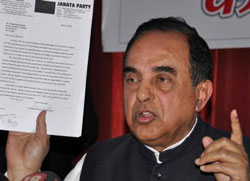 New Delhi, April 27: Janata Party chief Subramanian Swamy on Thursday made fresh allegations against Home Minister P Chidambaram, accusing him of delaying permission for the sale of Aircel to Malaysia-based firm Maxis in 2006 when he was the Finance Minister so that his son Karti financially benefited.
New Delhi, April 27: Janata Party chief Subramanian Swamy on Thursday made fresh allegations against Home Minister P Chidambaram, accusing him of delaying permission for the sale of Aircel to Malaysia-based firm Maxis in 2006 when he was the Finance Minister so that his son Karti financially benefited.
In his letter to Prime Minister Manmohan Singh, Swamy demanded Chidambaram's resignation and wanted a direction to the CBI to include the names of the Minister and his son in the FIR on Aircel-Maxis deal along with former Telecom Minister Dayanidhi Maran.
Swamy alleged that Advantage Strategic Consulting Private Limited, a company controlled by Karti Chidambaram, entered into a financial transaction with Malaysian businessman Sivasankaran’s Aircel Televenture in March 2006.
In May 2006, FIPB (Foreign Investment Promotion Board) approved the Malaysia’s firm Maxis investment of around Rs 4,000 crore in Aircel (where Maxis purchased 74 per cent share in Aircel).
Soon after the deal between Aircel and Maxis was completed, Rs.1,300 crore went out of Aircel in the form of loan without mentioning mandatory specification, he charged.
Swamy alleged that the reason Advantage Strategic Consulting partnered Aircel was to share Rs 4,000 crore invested by Maxis in Aircel.
Sources close to Karti Chidambaram dismissed the allegations as “baseless”.
Suspecting that entire transactions were dubious, he charged Chidambaram with using his position as finance minister and ensuring that FIPB would clear the Aircel-Maxis deal only if his son Karti controlled company got share in Sivasankaran’s Aircel Televenture Limited to get the booty from Maxis.
Swamy further alleged that the monthly report of RBI’s Overseas Investment Division on outward FDI from India showed that Advantage Strategic Consulting Private Limited has a wholly owned subsidiary (WSO) with a similar name in Singapore - Advantage Strategic Consulting Singapore PTE Limited.
The monthly reports from 2006-2012, show that several millions of US dollars were transferred each month from India to the company’s Singapore subsidiary.
According to RBI report, the Singapore subsidiary’s major activities are in Financial, Insurance, Real Estate and Business Services.
“Till 2008 December, Chidambaram was Finance Minister and here question arises how his son indulged in financial and insurance business in India and Singapore,” Swamy said. None of the transactions by Karti’s companies with entities abroad were shown in the financial statements filed with Registrar of Company in Chennai, Swamy said.
He said he had already written to the CBI, Enforcement Directorate and the Registrar of Companies regarding "dubious financial transactions" during the period of the deal.
Swamy alleged that CBI and ED were limiting their probe to the role of Marans, Dayanidhi and Kalanidhi, in the matter. The Congress party refused to react to the allegation against one its most important ministers.
"How am I am responsible for answering to allegations about Karti Chidambaram's business deals? He can himself reply to Swamy's allegations," party spokesperson Renuka Choudhary told reporters.





Comments
Add new comment